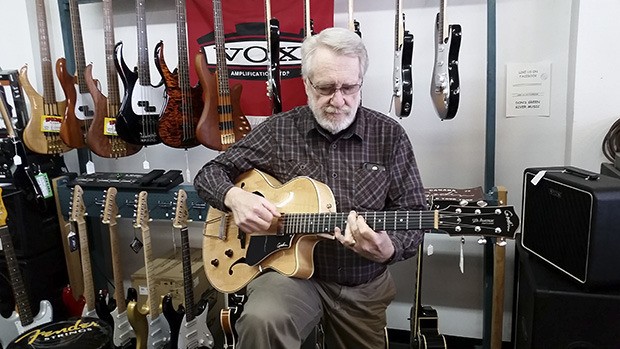Serendipity, from the Persian, means something like “a fortuitous discovery of things one was not questing for.”
Some call it sheer dumb luck, or being at the right place at just the right time.
Don Gardner, owner of Don’s Green River Music, likes the word. It is for him the silken thread tying together the various stages of his life, making them stages of a musician’s life.
In 1965, the then-20-year-old man, freshly drafted into the Army, expected to be shipped off to fight in Vietnam. Instead, the brass tapped him to play slide trombone in a military band, and he would go on to spend his service years playing at places like The Presidio in San Francisco, at the foot of the Golden Gate Bridge.
Luck was also there for him in 1970 when a musician acquaintance offered him a part-time job at Joe Farmer’s Music in Burien, just as The Boeing Co., where he was then working, was beginning its historical rounds of layoffs.
And it was there for him in 1976 when he ended his partnership with Larry and Don’s Music Store on Kent’s East Hill and rented the old Walker Wright store on East Main Street in Auburn.
“I expected it to be only this hole in the wall and to just eke out a living,” Gardner said.
Instead, on a tip from a customer, he moved into a much bigger place, a former motorcycle shop a few blocks southwest on Auburn Way North.
Bustling business
During the late ’70s and early to mid-’80s, Green River Music was a jumping joint. It was a moneymaker, the central gathering place, the purchase-an-instrument-and-take-a-lesson place for generations of local musicians, crammed literally to the rafters with guitars, amplifiers, trumpets and other instruments.
But after 39 years in business, Gardner is closing the doors. In that span, Gardner went through fat, lean, and near bust years that saw the business waltz from East Main to Auburn Avenue South to South Division Street and finally back to his old store on Auburn Avenue South.
“I expect to close in about a month,” Gardner said this week. “It’s not so much about other opportunities. I just turned 70 this past year, and I’m not at the store anymore. It’s not making me any money. I would do better to lease the building, which I bought back in the ’70s. I’d rather collect a rent check than be responsible for an ongoing business that’s a shadow of its former self.”
His main worries center on his two remaining teachers and where they will go.
Gardner did not even consider selling because, he said, given today’s market, who would buy? Nobody, he told himself, in an era when behemoth, out-of-state chains have gobbled most of the once-locally-owned music stores, with a few notable exceptions.
“One thing that has changed … is that the big box retailer – our equivalent of Walmart – has just devastated this industry. That can be observed by the fact that the privately-owned, local music stores are almost history. There’s one in Renton, there’s one out in Enumclaw,” Gardner said. “And of course, the Internet has had an incredible impact on everything, music stores, bookstores, camera stores, you name the commodity. It’s tough to make it work today. The month before Guitar Center opened, we had over a million in sales. We were the largest music store in South King County. When they opened, my sales took a 20-percent hit. And sales just continued to go down.”
Gardner said that when he was green to the business, virtually all the music stores in the area, even the chains, were locally owned. You lose a lot when you no longer have stores like that, he said. The same thing that’s lost, he said, when a Walmart or a Home Depot forces the closure of a community’s hardware store.
“What you lose is the local connection,” Gardner said. “You’ll never see the owner in the store because they don’t even live in the state of Washington. You lose your expertise because most of those places pay minimum wage or some sort of commission-based incentive sort of thing. They have a high turnover rate and don’t have long-term employees.”
Musician early on
Gardner was a third-grader in Burien the day a music teacher, sizing him up, decided that with his height and long arms, he could play trombone. Later, at Highline High School, he played bass in a rock-and-roll band called The Accents.
Looking back, he can only marvel how he got to where he is and the many close friends he has made in the local music scene.
“I’ve been in the music industry since the big layoffs at Boeing in 1970. I was a paper pusher working at Boeing, and my whole career path was something other than this,” Gardner said. “This was never planned. My whole career has been pretty serendipitous. It’s just a set of circumstances that I ended up in this.
“I was playing music with a fellow that managed a music store and he offered me a job. and the rest is history.”
Gardner said he expects to continue playing at various local venues, including with his big-band trio, but no doubt, some part of him will miss the store.
“I just enjoyed the commodity that I dealt with. I enjoyed the customers that came in. I enjoyed the banter about music and instruments,” Gardner said. “And then, over the years, I’ve had a number of customers that have turned into really good friends.”


